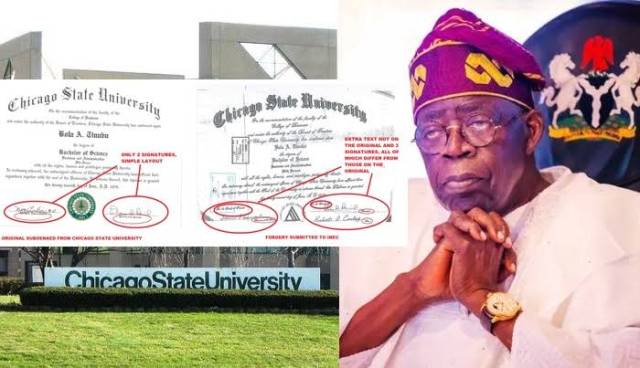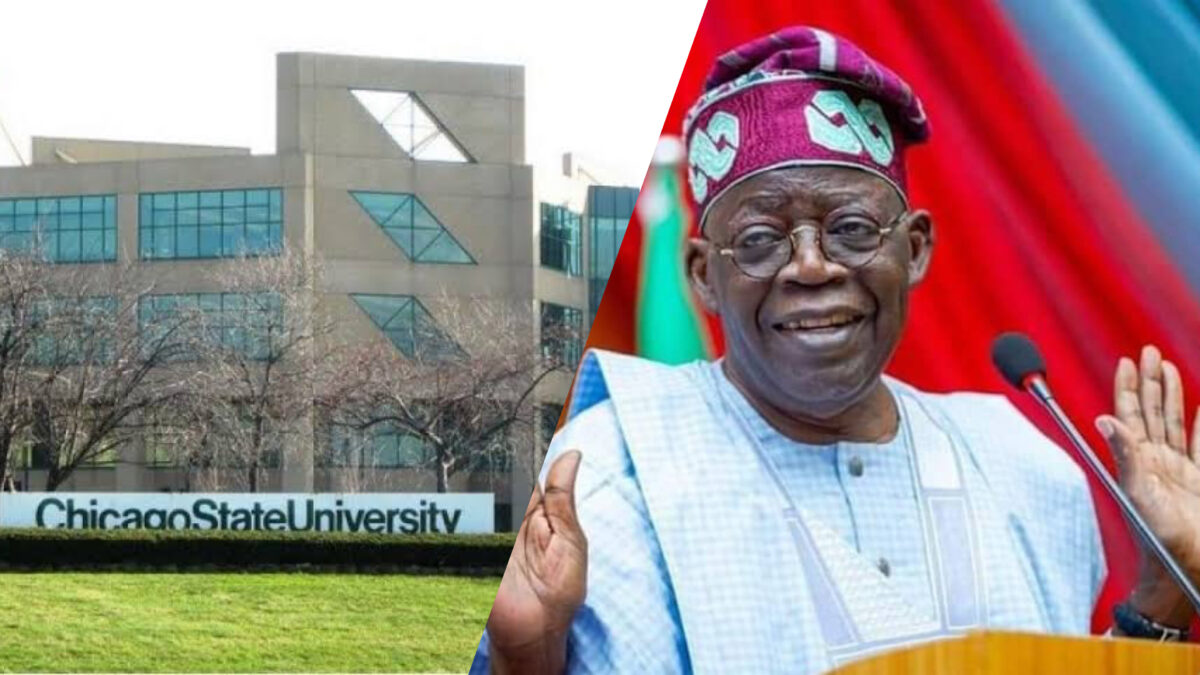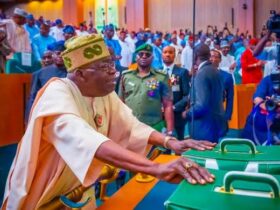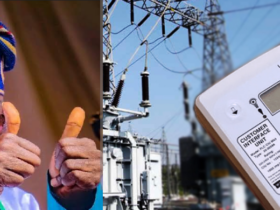A United States District Court in the Northern District of Illinois has issued an order mandating Chicago State University (CSU) to release President Bola Tinubu’s academic records to Alhaji Atiku Abubakar, the former Vice President of Nigeria and the presidential candidate of the Peoples Democratic Party (PDP).
This release is to be completed by mid-day today, October 2, and the deposition of the university must be concluded by tomorrow, Tuesday, October 3.
The court’s decision comes after Hon. Nancy Maldonado overruled Tinubu’s objection to the disclosure of his academic records at CSU to Atiku.
This legal battle, lasting nearly two months, centered on the authenticity of the diploma certificate held by Nigeria’s president and resolved a long-standing dispute about Tinubu’s educational qualifications spanning nearly three decades.
In her court ruling on September 30, Maldonado stressed that her decision did not express any view on the validity of Atiku’s claims regarding President Tinubu’s graduation from CSU or the Nigerian election’s legitimacy. She also made it clear that it was not within the jurisdiction of the U.S. court to opine on such matters or predict foreign courts’ rulings when presented with evidence from CSU.
The court upheld Magistrate Judge Jeffrey Gilbert’s earlier decision to grant Atiku’s discovery request, citing that Atiku met the statutory requirements and discretionary factors favored granting the application.
READ ALSO: Go To UNN, They’ll Hand Over My Transcript To You — Peter Obi
Maldonado emphasized that the court should not obstruct the release of information held by a U.S. institution in a matter of such significance, especially when the respondent (CSU) was willing to provide it.
She agreed that Atiku’s interest in obtaining this information outweighed Tinubu’s privacy concerns and that the court should not be concerned with any potential burden on CSU in producing the records.

Judge Gilbert had previously directed CSU to produce certain documents and testimony related to Tinubu within 48 hours in response to Atiku’s discovery request. Dissatisfied with this order, Tinubu sought to temporarily halt it until September 25, when he planned to file an appeal.
He argued that Gilbert had made an erroneous order and had exceeded his mandate by recommending a final judgment to the district court.
Tinubu also cited U.S. privacy laws regarding academic records and argued that the documents Atiku sought were only for expeditious purposes and could not be used in Nigeria’s highest court.
However, Judge Maldonado, in her Saturday judgment, upheld and adopted Gilbert’s decision.
She found merit in Atiku’s case and ruled that the order should not be limited to the diploma certificate Tinubu had submitted to the Independent National Electoral Commission (INEC).
The judge held, “With three factors weighing in favour, and one neutral, the court finds on balance the discretionary factors support granting Atiku’s application.
READ ALSO: Independence Day: Remain Hopeful For Better Nigeria, Obi Tells Nigerians
“President Tinubu did not specifically object to Judge Gilbert’s rulings with respect to the scope of the discovery requests, other than to generally state they are too broad.
“But even if he had, the court independently finds the requests are appropriately tailored to seek relevant information.
Atiku did not object to the portion of Judge Gilbert’s ruling limiting the scope of his request for production four mentioned above, and at any rate, the court agrees that asking CSU to conduct electronic discovery is neither justified nor feasible at this time.
“The court, therefore, adopts Judge Gilbert’s ruling on the scope of the discovery requests. CSU must respond to Requests for Production Nos. 1 through 4, though CSU need not respond to the portion of Request No. 4 that seeks ‘all communications to or from CSU concerning the certification of such documents by Jamar C. Orr, Esq., during the period of August 1, 2022 to August 1, 2023.’ (Dkt. 40 at 28.)
“As for the deposition, CSU must produce a witness that can address all five topics identified in the subpoena.”
The district court clarified that the matter at hand had a narrower scope. It asserted that, in accordance with relevant U.S. law and federal discovery rules, Atiku had the right to request documents and testimony from CSU.
The judge ruled on Atiku’s entitlement to the requested documents, stating, “The court affirms his entitlement. This decision aligns with the fundamental purpose of 28 U.S.C. § 1782, which aims to facilitate foreign court assistance, and conforms to the generous discovery standards outlined in the Federal Rules of Civil Procedure, promoting the disclosure of potentially pertinent information.”
Also, the court emphasized that its conclusion was based on the fact that the magistrate court, despite Tinubu’s assertion, had not issued a final ruling but had provided a “report and recommendation,” subject to a de novo review for any disputed portions.
Regarding Tinubu’s argument that Atiku could not utilize academic records in his appeal to the Supreme Court, the district court clarified that it would not engage in speculation about Nigerian law and procedure.
It noted that it had before it a sworn affidavit, unopposed by President Tinubu before Judge Gilbert, indicating that the Supreme Court of Nigeria could consider new evidence under “exceptional circumstances.”
“In other words, it is undisputed that there is a mechanism by which Atiku could potentially inject the requested discovery into the foreign proceedings.
Whether the Supreme Court of Nigeria will ultimately allow Atiku to use the documents, or whether it will consider them in its decision, are not questions for the court to resolve.
“The potential means for Atiku to use the discovery in the foreign proceedings is sufficient, and this court goes too far if it requires Atiku to show that his use must be successful.”
In spite of Tinubu’s objection, the court emphasized that Atiku was not only challenging the validity of one diploma but was also raising doubts about whether President Tinubu had indeed attended and obtained an undergraduate degree from CSU. This is noteworthy, even though CSU has confirmed that President Tinubu attended and graduated on June 22, 1979.
“In other words, while Atiku’s challenge to the election results is tied to the submission of an allegedly fraudulent diploma, he has raised other broader claims in the same proceedings before the Court of Appeal about President Tinubu’s identity and graduation, as well as the authenticity and origin of other CSU documents that were obtained and produced as part of other Nigerian proceedings.”
Stating that Atiku’s case extended beyond the authenticity of a single document and encompassed broader questions regarding Tinubu’s (and CSU’s) statements about his attendance and graduation, the court emphasized that the discovery of other documents from CSU related to the president’s attendance and graduation held relevance to Atiku’s claims and were deemed appropriate for use in the foreign proceedings.
The judge affirmed, “Therefore, the ‘for use in’ statutory requirement under section 1782 is deemed fulfilled by the court. It should be noted that in making this determination, the court is not taking a stance on the merits of any of Atiku’s underlying claims, whether they pertain to the authenticity of the diploma submitted to the INEC, President Tinubu’s education and graduation, or the accuracy of any other CSU documents produced in the Nigerian proceedings.”
“Nor should the court’s opinion be read as taking any position on any of the broader claims as to the validity of the election or what the documents and discovery from CSU might or might not show.
“The court simply finds that Mr. Abubakar has cleared the relatively low hurdle of showing that the documents he seeks could be relevant to his claims (either proving them or disproving them) and could potentially be presented to the Supreme Court of Nigeria.
“For the foregoing reasons, the court overrules President Tinubu’s objections to Magistrate Judge Gilbert’s recommended ruling, and therefore adopts the ruling in full. Atiku’s Application is therefore granted.
“In light of the pending Supreme Court of Nigeria deadline, represented to the court as October 5, 2023, and based on CSU’s representations that it is ready to comply with the discovery requests and produce a witness, the court sets an expedited schedule for completion of discovery.
“Respondent CSU is directed to produce all relevant and non-privileged documents in response to Requests for Production Nos. 1 through 4 (as narrowed by Judge Gilbert and adopted here) in Atiku’s subpoena, by 12:00 p.m. (noon) CDT, on Monday, October 2, 2023.
“The Rule 30(b)(6) deposition of CSU’s corporate designee must be completed by 5:00 p.m. CDT on Tuesday, October 3, 2023. Given the October 5, 2023, filing deadline before the Supreme Court of Nigeria, the Court will not extend or modify these deadlines.”
Atiku and PDP, which came second in the 2023 presidential election in Nigeria with 6,984,520 votes, is seeking the nullification of Tinubu’s presidency on the grounds of substantial non-compliance with the electoral laws, massive irregularities, and corrupt practices, among others.
The former vice president asserted that Tinubu should not have entered the presidential race on February 25 due to alleged criminal offenses such as forgery, perjury, and dual citizenship.
However, a five-member panel at the presidential election tribunal unanimously rejected Atiku and the PDP’s petition on September 6, deeming it lacking in merit. The tribunal ruled that the petitioners failed to substantiate their claims of misconduct during the presidential election and did not address the allegations of certificate forgery and perjury against Tinubu since they were not included in their main petition.
Determined to substantiate these allegations, Atiku, who served as vice president from 1999 to 2007, turned to a U.S. court to obtain additional evidence. He intended to present this evidence before the Nigerian Supreme Court, where he had already filed an appeal against what he deemed a “perverse” decision by the presidential tribunal.
Atiku based his application on Order 2 of the Supreme Court Rule, which outlines the procedure for presenting additional evidence in court. He requested an order of mandamus compelling the CSU (the educational institution in question) to disclose information related to Tinubu’s academic record. He argued that according to Section 137(1)(j) of the Nigerian constitution (amended in 2010), no one could legitimately be elected as Nigeria’s president if they had presented a forged certificate to the Independent National Electoral Commission (INEC).
Tinubu had submitted a certificate to INEC on June 17, 2022, claiming it was issued in 1979 and signed by Elnora Daniel. However, it was revealed that Daniel only joined CSU in 1998, 19 years after Tinubu’s alleged graduation. She left the institution in 2008, 14 years before the issuance of another certificate in Tinubu’s name by CSU in June 2022, which was done under subpoena from a Nigerian lawyer making inquiries about Tinubu’s education.
These irregularities prompted Atiku to file the lawsuit, seeking CSU’s records related to Tinubu and the availability of its top officials for depositions to authenticate the records, as per the instructions of Atiku’s legal team.








Leave a Reply